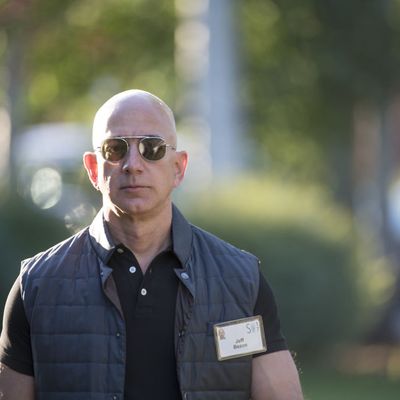
Amazon casts a long shadow.
A Reuters examination of all the quarterly results filed by U.S. companies in 2017 found that nearly 700 companies mention the e-commerce behemoth. Meanwhile, the company was mentioned “either in passing or with some urgency” in roughly 10 percent of earnings calls, when a company representative talks to analysts and media about a company’s performance. The companies talking about Amazon range from giants like 3M to relatively unknown companies like swimming-pool-equipment manufacturer Pool Corporation.
The easiest example of Amazon’s massive influence is seen in the terrible month suffered by Blue Apron. The company’s IPO in late June was supposed to launch the meal-kit-delivery service to the next level, bringing in a fresh infusion of cash and making it the de facto choice for those who want to cook a meal, but don’t want to go to the grocery store. The company hoped for a $3.2 billion valuation. Then Amazon bought Whole Foods for $14 billion in mid-June. Suddenly, Blue Apron was worth a lot less — by the time its IPO made its debut on the stock exchange on June 29, Blue Apron was valued at $1.3 billion.
But the real pain was still to come. Amazon quietly registered a trademark for a meal-kit-delivery service in early June with this description: “We do the prep. You be the chef.” When The Sunday Times of London discovered the trademark on July 16, investors panicked, sending Blue Apron’s stock down below $7 per share. On Tuesday, co-founder Matthew Wadiak stepped down from his role as chief operating officer. More shake-ups may be in Blue Apron’s future.
In fairness, some of the fundamentals of Blue Apron already looked shaky — even before Amazon bought Whole Foods, regulatory filings revealed that the company was losing more money each year since it was founded, as it paid increasingly steep customer-acquisition costs.
Companies that have attempted to compete in e-commerce have dealt with Amazon for years. But with its sudden acquisition of a tremendous amount of retail space and its continued experiments in brick-and-mortar stores, the number of company’s forced to reckon with Amazon has increased. Speaking to Reuters, investor Alan Lancz put it simply: “Just that name puts fear even if it’s just a rumor that they might be going into your space.”





























